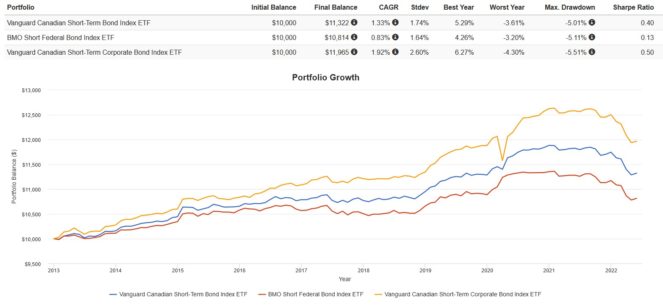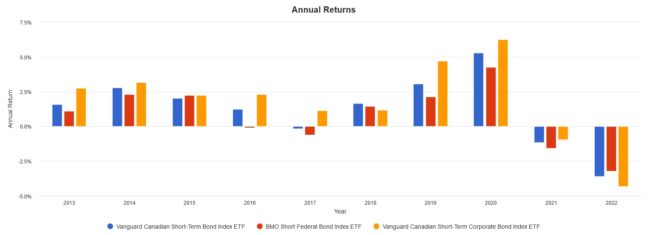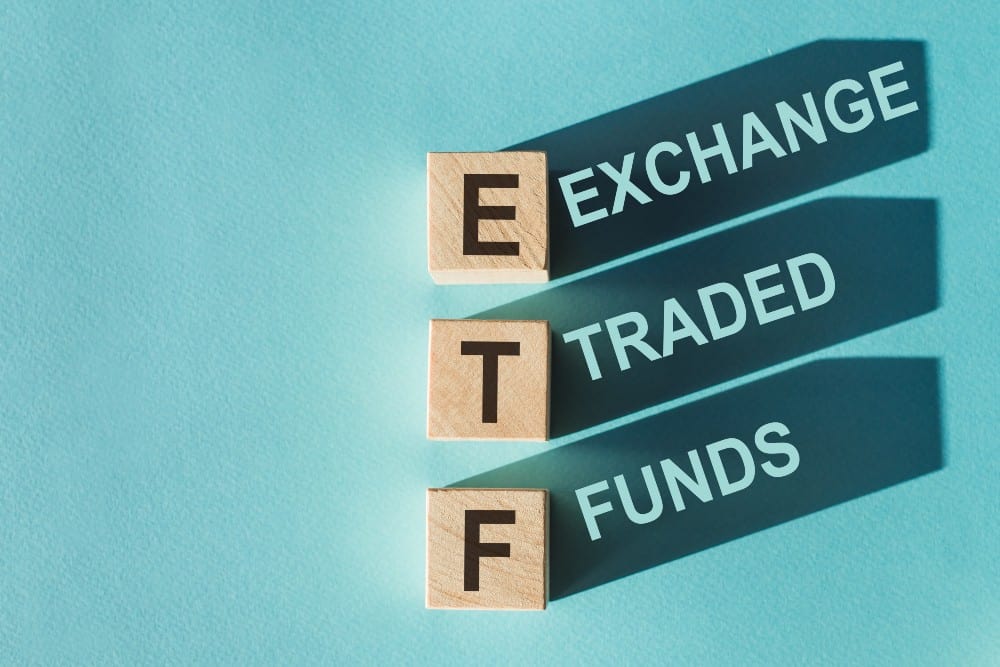Welcome to a series where I break down and compare some of the most popular exchange-traded funds (ETFs) available to Canadian investors!
Canadian investors looking to reduce their portfolio’s risk in a rising-rate environment often opt for short-term bonds with less interest rate risk. Fund managers like Vanguard and BMO Global Asset Management provide a set of low-cost, high-liquidity ETFs that offer exposure to a portfolio of short-term bond instruments.
The three tickers up for consideration today are Vanguard Canadian Short-Term Bond ETF (TSX:VSB), Vanguard Canadian Short-Term Corporate Bond Index ETF (TSX:VSC), and BMO Short Federal Bond Index ETF (TSX:ZFS). Which one is the better option? Keep reading to find out.
VSB vs. VSC vs. ZFS: Fees
The fee charged by an ETF is expressed as the management expense ratio (MER). This is the percentage that is deducted from the ETF’s net asset value (NAV) over time, calculated on an annual basis. For example, an MER of 0.50% means that for every $10,000 invested, the ETF charges a fee of $50 annually.
VSB and VSC both have an MER of 0.11% vs. 0.22% for ZFS — a difference of $11 in a $10,000 portfolio. The MER on short-term bond ETFs is very important due to their low yield — a small percentage can detract significantly from the payouts. For this reason, VSB and VSC are the clear winners here.
VSB vs. VSC vs. ZFS: Size
The size of an ETF is very important. Funds with small assets under management (AUM) may have poor liquidity, low trading volume, high bid-ask spreads, and more risk of being delisted due to lack of interest.
VSB currently has AUM of $1.32 billion, VSC has $1.16 billion, and ZFS has $307 million. All three are more than sufficient for a buy-and-hold investor, but VSB is the most popular at this time.
VSB vs. VSC vs. ZFS: Holdings
When selecting a bond ETF, investors should pay attention to three considerations. First, check the credit quality of the bonds. Ideally, we want bonds rated A, AA, and AAA. We don’t want junk bonds, as our goal here is to reduce volatility, not increase it. VSB is 46.8% AAA, 31.5% AA, and 13.2% A. VSC is 0.1% AAA, 41.6% AA, and 33.5% A. ZFS is 100% AAA.
Second, check the composition of the bonds. Bonds are generally separated into corporate and government bonds. Corporate bonds have higher yields but also carry default risk, making them fall when stocks crash. Government bonds have lower yields but virtually no default risk. In terms of safety during a crash, ZFS (pure government) is best, followed by VSB (blend), with VSC (pure corporate) last. In terms of yield potential, the order is reversed.
Third, check the effective duration of the bond. This is a measure of how sensitive the bond is to interest rate movements. Bond prices move inverse to interest rates. For example, a bond with an effective duration of 2.46 years would lose approximately 2.46% if interest rates rose by 1%. VSB, VSC, and ZFS have average durations of 2.6, 2.7, and 2.6, respectively.
VSB vs. VSC vs. ZFS: Historical performance
A cautionary statement before we dive in: past performance is no guarantee of future results, which can and will vary. The portfolio returns presented below are hypothetical and backtested. The returns do not reflect trading costs, transaction fees, or taxes, which can cause drag.
Here are the trailing returns from 2013 to present:

Here are the annual returns from 2013 to present:

VSC pulled ahead thanks to its stronger yielding corporate bonds. However, pay attention to March 2020 on the charts. Notice how VSC plunged sharply, while VSB dropped slightly, and ZFS rose. This is because corporate bonds are more correlated with stocks during a crash. Pure government bonds tend to do the opposite (flight to quality), making them suitable as a hedge.
The Foolish takeaway
All three short-term bond ETFs are good for minimizing interest rate risk, but corporate bonds like VSC are better for income and government bonds like ZFS are better for crash protection. A good low-cost middle ground could be VSB, which contains a balanced blend of both.



